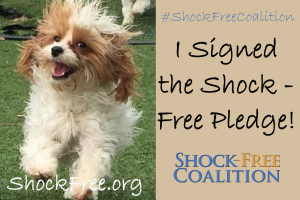Initiative calls for the worldwide elimination of shock devices in animal training, care, management, and behavior modification; seeks consumer transparency for pet owners seeking professional advice
The Pet Professional Guild (PPG) has launched the Shock-Free Coalition, a global advocacy campaign which aims to end the practice of using electric shock to train, manage, and care for pets, build a strong and broad movement committed to eliminating shock devices from the supply chain, and create transparency on the methods used for consumers seeking professional advice on pet behavior or training issues.
Developed through PPG’s Advocacy Committee, the Shock-Free Coalition launches with a week-long campaign featuring a wide-ranging series of educational and promotional activities, including an “Ask the Expert” Facebook chat with well-known dog trainer and author, Jean Donaldson, on September 27, 2017 at 3 p.m. E.T., a special “Shock-Free”
 Part of the Shock-Free Coalition’s remit is to educate pet owners and shelter/rescue workers to help them provide the pets under their charge the best care and training, and to help owners find competent, professional industry service providers they can trust to use only humane practices. Global leaders in the animal welfare, veterinary, behavior and training worlds — such as celebrity dog trainer, Victoria Stillwell, the aforementioned Dr. Bekoff, and renowned author, veterinarian and certified applied veterinary behaviorist, Dr. Karen Overall — have all lent their voices to the Shock-Free Coalition, which comes at a time when animal behavior and emotions, based on the growing body of research, are understood better than ever before. Numerous studies, conducted by veterinary scientists and canine behavior specialists worldwide, indicate that the use of pain and fear to train animals risks causing physical injury, as well as a host of psychological issues that may include a pet becoming fearful of other animals and people — and potentially aggressive towards them as a result.
Part of the Shock-Free Coalition’s remit is to educate pet owners and shelter/rescue workers to help them provide the pets under their charge the best care and training, and to help owners find competent, professional industry service providers they can trust to use only humane practices. Global leaders in the animal welfare, veterinary, behavior and training worlds — such as celebrity dog trainer, Victoria Stillwell, the aforementioned Dr. Bekoff, and renowned author, veterinarian and certified applied veterinary behaviorist, Dr. Karen Overall — have all lent their voices to the Shock-Free Coalition, which comes at a time when animal behavior and emotions, based on the growing body of research, are understood better than ever before. Numerous studies, conducted by veterinary scientists and canine behavior specialists worldwide, indicate that the use of pain and fear to train animals risks causing physical injury, as well as a host of psychological issues that may include a pet becoming fearful of other animals and people — and potentially aggressive towards them as a result.
Although electric shock in animal training is currently banned in some countries, it is still legal in many others, including the United States. While it is not unusual and, in many cases, is mandated, that providers and manufacturers of potentially dangerous services and products provide warnings so that information regarding any risk from use, including potentially injurious side effects, are transparent for end users, professional dog trainers and behavior consultants currently have no legal responsibility whatsoever to disclose their methods. This can be and, indeed, is very misleading to unsuspecting pet owners who have no knowledge of the pet industry’s lack of standards and regulation, or the differences between training methods and equipment. In many cases, pet owners only find out about these differences — and the fallout associated with them — when they find themselves encountering behavior problems caused by the use of aversive techniques and equipment.
“As the pet training industry is entirely unregulated at present, anyone can say they are an animal trainer or behavior consultant,”
“What is especially sad is that many people do not realize that they are hurting and scaring their pets by using such devices. Unfortunately, they often find out the hard way when their pet becomes shut down from fear or aggressive towards people and/or other animals as fallout from the electric shock. Fear is incredibly easy to instill in any animal, and exceptionally difficult to get rid of. These pet owners usually end up facing a long road of hard work that can require a tremendous amount of patience, time and money to help their pet overcome this newly — and unnecessarily — created fear. Indeed, in all too many cases, a pet may end up being abandoned in a shelter, inaccurately labeled as “aggressive,”
About The Pet Professional Guild
The Pet Professional Guild is a 501(c)6 a member organization founded on the principles of force-free training and pet care. Its membership represents pet industry professionals who are committed to force-free training, pet care philosophies, practices and methods. Pet Professional Guild members understand force-free to mean that shock, pain, choke, fear, physical force, and/or compulsion-based methods are never employed to train or care for a pet.
About the Shock-Free Coalition
The key purpose of the Shock-Free Coalition is to build a strong and broad movement committed to eliminating shock devices from the supply and demand chain. This goal will be reached when shock tools and equipment are universally unavailable and not permitted for the training, management and care of pets.The Shock-Free Coalition believes that pets have an intrinsic right to be treated humanely, to have each of their individual needs met, and to live in a safe, enriched environment free from force, pain and fear. The initiative has been developed purposely to bring together parties that have mutual business interests and a personal investment in the welfare of pets and embraces stakeholders of similar values and interests, enabling all parties to combine their resources and become more successful in achieving the stated goals. Members of the Shock-Free Coalition consider it to be their responsibility and utmost obligation to be vigilant, to educate, to remain engaged and work toward eliminating shock as a permissible tool so it is never considered a viable option in the training, management and care of pets.
Key Pet Professional Guild Position Statements
The Use of Shock in Animal Training: https://petprofessionalguild.com/
The Use of Remote Electric Shock: https://petprofessionalguild.com/The-Use-of-Remote-Electric-Shock/
The Use of Pet Correction Devices: https://petprofessionalguild.com/Equipment-Used-for-the-Management-Training-and-Care-of-Pets/


